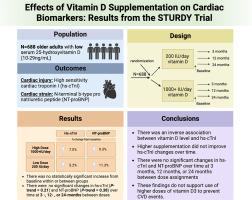补充维生素 D 对心脏生物标志物的影响:STURDY 试验的结果
IF 5.9
Q1 CARDIAC & CARDIOVASCULAR SYSTEMS
引用次数: 0
摘要
目的在观察性研究中,血清维生素 D 水平低的老年人罹患心血管疾病(CVD)的风险较高,但随机试验未能证明补充维生素 D 可降低 CVD 风险,这可能是因为测试的维生素 D 补充剂剂量太低。我们的目的是确定较高剂量的维生素 D 补充剂是否能降低亚临床心血管疾病的标志物--高敏心肌肌钙蛋白(hs-cTnI)和 N 端前 b 型钠尿肽(NT-proBNP)。方法 "减少跌倒和维生素 D 在您体内的应用研究"(STURDY)是一项双盲、随机、反应适应性试验,测试了补充 4 种剂量的维生素 D3(200、1000、2000、4000 IU/天)对血清 25- 羟基维生素 D 浓度较低(10-29 ng/mL)的老年人跌倒风险的影响。我们在基线、3 个月、12 个月和 24 个月的随访中测量了 Hs-cTnI 和 NT-proBNP 水平。在这项辅助研究中,我们使用了原始试验中的数据,并按治疗组(低剂量(200 IU/天)或高剂量(1000 IU以上/天))对参与者进行了比较。结果在 688 名参与者(平均年龄 76.5 岁)中,低剂量组和高剂量组的 hs-cTnI 分别增加了 5.2% 和 7.0%;同样,NT-proBNP 分别增加了 11.3% 和 9.3%。与低剂量相比,高剂量维生素 D 补充剂不会影响 hs-cTnI(差异为 1.6%;95% CI:-5.3,8.9)或 NT-proBNP(差异为-1.8%;95% CI:-9.3,6.3)。本文章由计算机程序翻译,如有差异,请以英文原文为准。

Effects of vitamin D supplementation on cardiac biomarkers: Results from the STURDY trial
Objectives
In observational studies, older adults with low serum vitamin D levels are at higher risk of cardiovascular disease (CVD), but randomized trials have failed to demonstrate reduction in CVD risk from vitamin D supplementation, possibly because the doses of vitamin D supplements tested were too low. Our objective was to determine if higher doses of vitamin D supplementation reduce high-sensitivity cardiac troponin (hs-cTnI) and N-terminal pro-b-type natriuretic peptide (NT-proBNP), markers of subclinical CVD.
Methods
The Study to Understand Fall Reduction and Vitamin D in You (STURDY) was a double-blind, randomized, response-adaptive trial that tested the effects of 4 doses of vitamin D3 supplementation (200, 1000, 2000, 4000 IU/day) on fall risk among older adults with low serum 25-hydroxyvitamin D concentrations (10–29 ng/mL). Hs-cTnI and NT-proBNP levels were measured at baseline, 3-, 12-, and 24-month follow-up visits. For this ancillary study, we used data from the original trial and compared participants by treatment group: low-dose (200 IU/day) or high-dose (1000+ IU/day). The effects of vitamin D dose on biomarkers were assessed via mixed effects tobit models.
Results
Among 688 participants (mean age of 76.5) hs-cTnI increased in both the low- and high-dose groups by 5.2 % and 7.0 %, respectively; likewise, NT-proBNP increased by 11.3 % and 9.3 %, respectively. Compared to the low-dose, high-dose vitamin D supplementation did not affect hs-cTnI (1.6 %-difference; 95 % CI: -5.3, 8.9) or NT-proBNP (-1.8 %-difference; 95 % CI: -9.3, 6.3).
Conclusions
Compared to low-dose vitamin D supplementation, doses ≥1,000 IU/ day did not affect markers of subclinical CVD in older adults with low serum vitamin D levels.
求助全文
通过发布文献求助,成功后即可免费获取论文全文。
去求助
来源期刊

American journal of preventive cardiology
Cardiology and Cardiovascular Medicine
CiteScore
6.60
自引率
0.00%
发文量
0
审稿时长
76 days
 求助内容:
求助内容: 应助结果提醒方式:
应助结果提醒方式:


